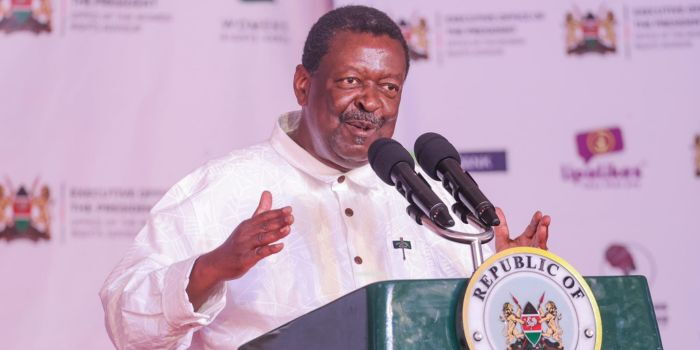In a bid to strengthen the current regulations on work permits in the country, Prime Cabinet Secretary Musalia Mudavadi has deleted, substituted, and amended four different classes of permits in the country.
In a special notice dated Tuesday, December 17, Mudavadi revealed that the government deleted sections of Class I permits and introduced new changes. Others affected also include classes N, P, Q, and R.
“In Exercise of the powers conferred by section 59 of the Kenya Citizenship and Immigration Act, the Cabinet Secretary for Interior and National Administration makes the following Regulations,” read the notice by the Prime CS.
“Hereinafter referred to as the principal Regulations are amended in the Seventh Schedule by- (a) deleting Class I and substituting thereof Class I: Approved Religious Activities, Class P, Class Q and Class R,” the statement by Mudavadi continued.
President William Ruto (right) and Prime CS Musalia Mudavadi (centre) and former CS of health Susan Nakhumicha at a past event.
Photo
Musalia Mudavadi
In the new changes, the government has awarded permits to Staff of the United Nations, Diplomatic Missions, Inter-Governmental Organisations, and International Non-governmental Organisations accredited to Neighbouring hardship countries under Class P.
Under Class P, staffers in the organisations accredited to or based in neighboring hardship countries and their families will be able to reside in Kenya, something they could not do before.
The practice has been that such people maintain a residence in Nairobi where they, together with their family, stay. They go to their stations for short periods and come back to Nairobi, to meet their families.
The new class P permit aims to continue to attract diplomatic staff. The government hopes that their stay in the country will benefit it considering the money they will pay for rent and fees for their children. For the permit, they will have to pay 200 dollars (Ksh25,852) for processing and an issuance fee of 1,000 dollars (Ksh129,260).
Class I Approved religious activities involve institutions registered under the Society Act and engaged in missionary and whose activities involve preaching or conduct of religious worship and rituals.
Under this class, the issuance certificate will cost Ksh20,000 down from Ksh50,000.
Class R involves a person who is a citizen of a Member State of the East African Community and is not a prohibited immigrant and who intends to reside, engage in employment, activity, business, trade or engage in any prescribed profession and whose presence in Kenya will be of benefit to Kenya.
For those in Class Q, they will be required to pay Ksh20,000 for processing and an annual amount of Ksh100,000. Class Q is a member of a prescribed profession and working for a Religious or charitable organization who is not involved in preaching or the conduct of religious worship and rituals and whose presence in Kenya will be of benefit to Kenya.
Digital Nomads will fall under Class N. This permit caters to digital nomads working remotely for overseas companies including ICT professionals, Project Managers, Editors, Graphic Designers, Bloggers, online teachers, freelancers, and others.
The permit will be issued to a person whose annual income is 24,000 dollars (Ksh3,102,240) down from 55,000 dollars (Ksh7,109,300). The price for this permit will be 1,000 dollars (Ksh129,260) annually with a 200-dollar (Ksh25,852) processing fee.
A photo collage of passengers stuck JKIA (left) and a US work permit application sheet.
Photo
San Diego Union/Visa Place


